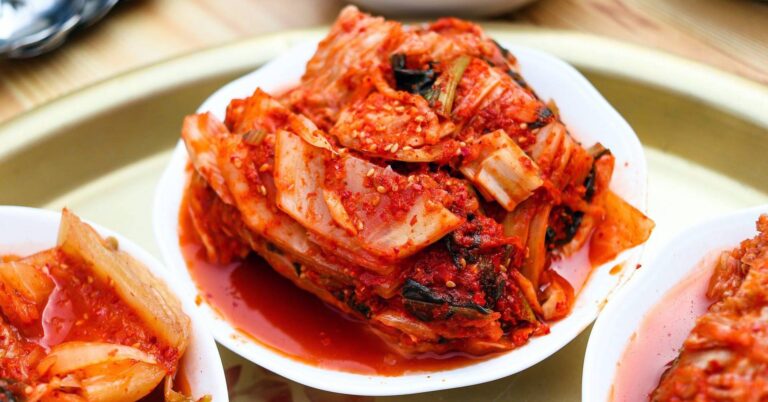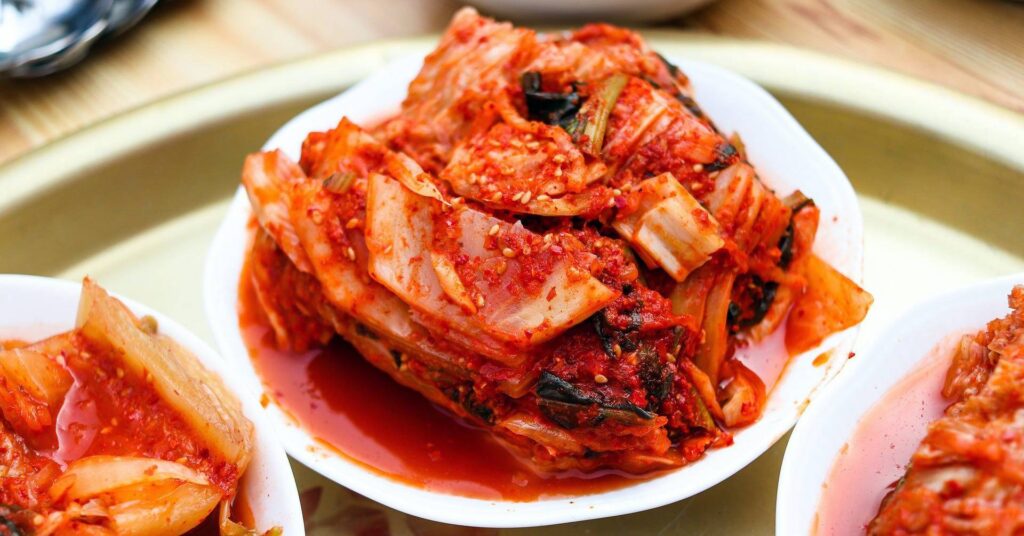The Korean Fermented Superfood: Kimchi
By
Riya Sood
and
Jennifer Dabbert

A red-hued, tangy mix of vegetables and seafood sauces, the famous Korean traditional food, Kimchi, hits so many taste buds on our palette: spicy, sour, salty, and umami. Once you take one bite, you will soon find yourself looking forward to more and more of its fermented tanginess. Not only is it tasty, it comes with the added gift of a number of health benefits for our brain and overall health.
Kimchi undergoes a fermenting followed by a salting process with over 2,300 types of probiotic lactic acid bacteria (LAB), that assist in eradicating pathogenic bacteria and increase the number of beneficial bacteria. Strains of LAB are shown to eradicate H. pylori populations in the gut, a bacteria that is known to cause peptic ulcers and inflammation of the stomach lining.
This humble vegetable is also packed with an assortment of powerful antioxidants that prevent cell damage, is high in fiber, and contains essential vitamins and minerals, such as iron and calcium. These characteristics make kimchi ideal for weight loss or weight management. The capsaicin found in the red pepper ingredient of kimchi stimulates metabolism and energy expenditure. A 2015 study found that when given freeze-dried kimchi capsules, obese individuals who consumed the kimchi supplement exhibited significant decrease in BMI and body weight, unlike the control group who did not receive the kimchi capsules. The LAB present in fermented kimchi, along with Bifidobacterium bacteria, is also known to have anti-obesity effects, including weight loss and insulin sensitivity.
Optimizes Brain Health
Not only is kimchi a delicious dish, it also contains many bioactive properties that can assist with a healthier brain. A 2018 study found that kimchi can mitigate the degenerative effects of Alzheimer’s Disease in mice. The anti-inflammatory and antioxidative properties found in kimchi markedly improved memory, learning, and problem solving skills that were initially compromised by the amyloid-beta protein, which is a known catalyst of Alzheimer’s Disease. This study is promising for humans, as mice are often used as a proxy for human health.
Mood and Thinking
Gut health and mental health has been shown to be greatly intertwined. Our gut microbiome can influence the likelihood of developing mood disorders such as depression and anxiety, as beneficial bacteria can impact serotonin synthesis and amino acid metabolisms. When provided with probiotic supplements, individuals with mild to moderate major depressive disorder showed significant decreases in depression diagnostic test scores. This indicates that when gut microbiome diversity increases due to probiotic supplements, their depression becomes less severe.
Inflammation is also a main contributor to mood disorders such as anxiety and depression. It is believed that systemic inflammation is influenced by the gut, and fermented foods like kimchi contain properties that can mitigate this inflammation. Kimchi also provides mood-regulating supplements, such as B vitamins, antioxidants, zinc, and magnesium, which can further improve mood and overall mental well-being.
These science-backed benefits undoubtedly make Kimchi one of the top fermented superfoods to maintain good health. Even better, there are over 200 types of kimchi made from different vegetables and spices to choose from.
